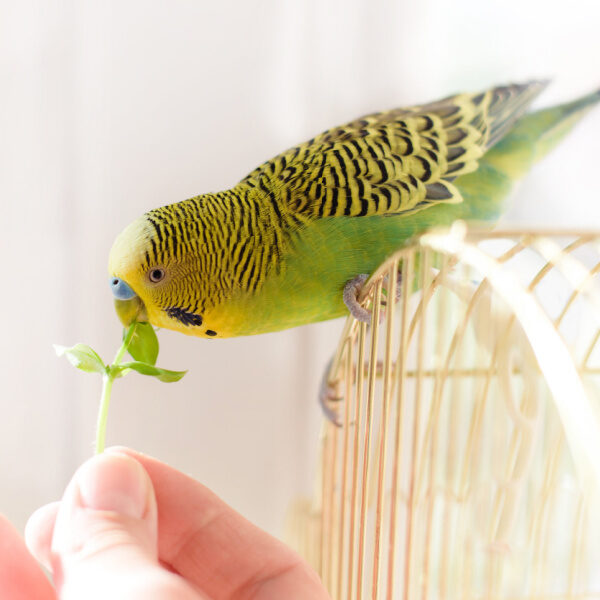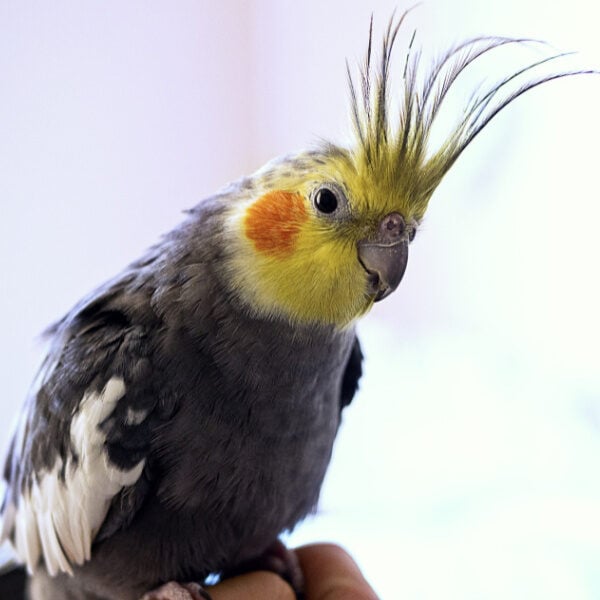Last Updated on by Mitch Rezman
Air travel with your bird is a post all its own so today we’ll focus on terrestrial travel.
We are moving all comments from the old style blog to this new fancy schmancy one, by hand. Any comments made today and moving forward, will be made under your own profile. We apologize for any confusion and hope this new format will help make us all better pet bird keepers.
We’ve talked about travel carrier rehearsal. As we approach the peak of the summer travel season I thought we’d talk about best practices for vehicular travel. We travel with Popcorn our (White Face Lutino) Cockatiel, seven days a week. On the weekends we have a permanent spot with a 25 foot (1979 vintage 🙂 travel trailer at a campground. It’s a 75-mile trip each way.
Traveling with her changes how we eat on the road because we won’t leave her in the car alone. She’s small so we’ll try to bring her into a restaurant once in a while but drive throughs are what this country is built on which keeps the three of us chilled out in the Windy City Parrot mobile.eliminating the need to drag a travel cage from and to the car.
Although we built a stick (wood, siding drywall) 3 foot bump out onto the trailer, anyone familiar with RVs knows that bird cages take up a disproportional amount of space relative to the size of said RV. We share your pain campers & road warriors.
Don’t fool yourself, there is no such thing as a “safe carrier.” As long as the carrier is bigger than your bird and your bird is stationary when your vehicle abruptly stops as in an accident or jam on the brake pedal, your bird will be launched at the precise speed you were formally moving at, think feathered missle – You’ve been warned.
The carrier should be secured to the floor or seat of the vehicle. Sometimes you can accomplish this with seat belts. SUV’s and vans may require a bit more creativity. If your carrier is on the seat of your car and you have a bigger bird, make sure you create space between the carrier and those nummy leather seats. Something solid like a 2 x 4. A Customer of ours traveled from Chicago to Miami annually with 4 Macaws. They fastened 4 large dog crates to the floor of their van and their Scarlet clung to the top of his carrier, hanging, quite happily for the entire 3000 mile round trip – go figure.
Some carriers come with perches, others do not. Usually you will start with a dowel or manzanita perch and you will want to install it side to side so you bird can look forward. The problem is this thing called “inertia,” but let’s back up and revisit a Conure with sore feet. If you don’t want to read the article, it basically says that birds have the ability to sleep on 1 foot because they can lock one or both feet using something called the flexor tendon in their lower leg, ankle and foot.
That means when your birds feet are wrapped around that wooden perch and your bird is facing forward, every time the vehicle accelerates or decelerates your bird either has to move quickly to the wall of the cage for stabilization or in most cases they just grip the perch tighter because of the unexpected moment. This stresses not only their feet but it makes the trip in an unfamiliar container that much more stressful for the bird.
How do you help your bird deal with this unwanted inertia? Think public transportation.
With the Booda soft rope perch configured as an upside down “U” the bird can have one foot on the bottom of the perch with the other foot holding a vertical part like holding a pole on a bus. Way less stressful on the bird.
Once again a Booda Comfy perch is ideal for the traveling bird. It not only helps counteract inertia but with prolonged “foot to a single perch contact” the softer surface provides welcome relief over extended periods. It’s very easy to move longer Booda Comfy perches into different positions around the cage to help break up some of the monotony. (If someone can send me a picture of their bird using the Booda Comfy perch setup above or any Booda Comfy perch for that matter in a travel cage, first pic(s) we post earns a $10 gift certificate).
Other considerations should be:
- Use some sort of bolt on dish to ensure stability
- An ice cube or two in the water dish keeps the water cool and fresh while reducing spillage. (although if the dish will slosh a lot in travel, a nice juicy slice of apple in a dish or bottom of the carrier, will help with needed moisture and not make a big mess)
- Place a favorite “soft” chew toy where a bird can get it easily.
- Have someone other than the driver make sure the toy isn’t “bopping the bird” as the vehicle moves through traffic. Avoid swinging “hard” toys.
- If you are traveling after sundown cover the cage with a thicker cover or towel, even if it’s before birdie bedtime. Oncoming headlights in the dark can be scary and stressful.
- If your backside is getting uncomfortable and you feel you need to stop and stretch, so does your bird.
- That said, do not let the bird out of the carrier while still in the car even with the windows rolled up – ever!
- Everyone knows hot cars can literally bake a pet, and there’s also a lot of weirdos out there. Don’t leave your bird alone in your car.
- Whether you are visiting familiar faces or staying in a hotel or cabin, the same rules apply. No doors or windows get open unless the bird is in the cage – Flighted or not.
- If you change time zones, your bird doesn’t know it. If you have any routine with your bird try to keep to the home time zone.
- Don’t stay in places that a noisy bird can get you tossed. Call ahead to make sure the commercial establishment you are on your way to is pet-friendly.
- Confirm with Aunt Margaret that Uncle Henry decided against getting that Akita (a hunting dog that isn’t scared of wild boar). In other words, don’t let yourself be surprised about potential cross-species conflicts at your destination.
- Keep proof of ownership with you. A microchip is best but even a veterinary record and/or birth record should be on hand. If your bird were to escape and thankfully was captured then given to the authorities you would be in the position of thinking you could identify your bird visually. Unlike dogs & cats, all birds of a particular species look identical. Saying “yep, that’s my bird” may not be sufficient for release.
Travel can stress some birds. Other birds handle it quite well. You don’t know until you try. If you feel you need to introduce a compound that will help lower your bird’s stress level.
In general, common sense should prevail. If you are staying at a motel try to avoid a room facing the highway. Lots of scary noises. We have a customer who was visiting friends in Maryland when a shooter opened fire in a mall. She was not involved in the tragedy directly but staying close to where it occurred. Helicopters remained in flight around the clock and the noise from the aircrat triggered plucking in a very well-adjusted Umbrella Cockatoo. Take nothing for granted.
Bring cleanup supplies, most hosts don’t keep Poop-Off under the kitchen sink. Keep enough bird food on hand in an air and moisture tight container. The last thing you want to do is change to a Walmart seed diet because you ran out of food. The extreme change in diet would most likely amplify any inherent stress.
If your bird, is not socialized much outside of the home, travel is probably not the best time to begin interaction with strangers. That’s something you’ll have to test for but be prepared to cover the carrier when moving from your vehicle into the next stop.
I’d like to take a minute here to talk about practicing “safe social media”. We (all of us) love to post pictures of our travels. We notify Facebook friends in real time where we are and how much fun we’re having. So I’m going to just toss this out there. Like many of you, my Facebook friends list has many (hundreds?) of profile pics of birds. Hypothetical: You get a friend request, you looked at it and said to yourself “Gee, I have a Quaker too” – and you accept it. It could be a dog group, a cooking group. This type of random interaction negates any and all Facebook privacy settings creating a sense of complacency and room for a gross margin of error.
Where am I going with this? Unless you explicitly know 100% of your Facebook friends, there is always a possibility that eyeballs are focused on your timely Facebook vacation updates, broadcasting when your house will be empty for two weeks and that you won’t be home any time soon because you’re 1800 freakin’ miles away. I like to call it a burglar’s dream roadmap.
I’m advocating that you send all of your images and video to some fluffy cloud and then when you come home, make a slideshow that I could fall asleep to, helping counteract the effects of the Five Hour Energy tonic I took prior to the undertaking of writing the next blog post.
*What is a “WindyCityParrot.com Certified product”? There are no universal solutions for any particular species of caged birds. We “Certify” products when we feel we’re confident by getting enough customer feedback.
written by Mitch Rezman
approved by Catherine Tobsing
Author Profile
Latest entries
 Feeding Exotic BirdsDecember 29, 2025How to Switch or Convert Your Bird From Seeds to Pellets: Real-Life Case Studies and Practical Guidance
Feeding Exotic BirdsDecember 29, 2025How to Switch or Convert Your Bird From Seeds to Pellets: Real-Life Case Studies and Practical Guidance Feeding Exotic BirdsDecember 16, 2025A Practical, Budget-Smart Guide to Feeding Birds Well
Feeding Exotic BirdsDecember 16, 2025A Practical, Budget-Smart Guide to Feeding Birds Well Bird EnviornmentsDecember 7, 2025Understanding Budgie Cage Bar Orientation: Myths, Realities & Practical Solutions for Vertical-Bar Bird Cages
Bird EnviornmentsDecember 7, 2025Understanding Budgie Cage Bar Orientation: Myths, Realities & Practical Solutions for Vertical-Bar Bird Cages Feeding Exotic BirdsDecember 5, 2025How Dr. T.J. Lafeber Rewrote the Future of Pet Bird Nutrition
Feeding Exotic BirdsDecember 5, 2025How Dr. T.J. Lafeber Rewrote the Future of Pet Bird Nutrition



